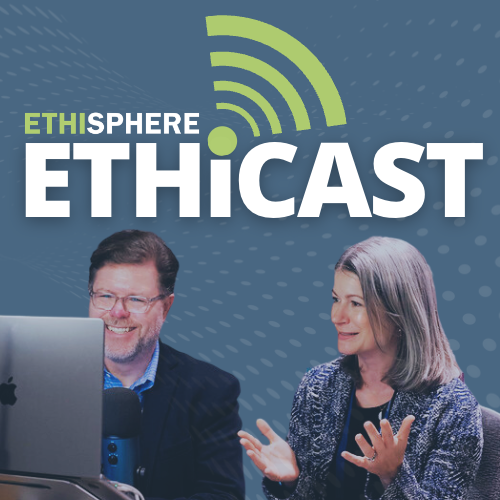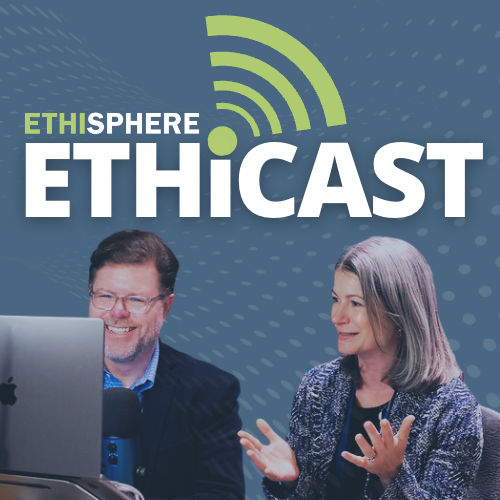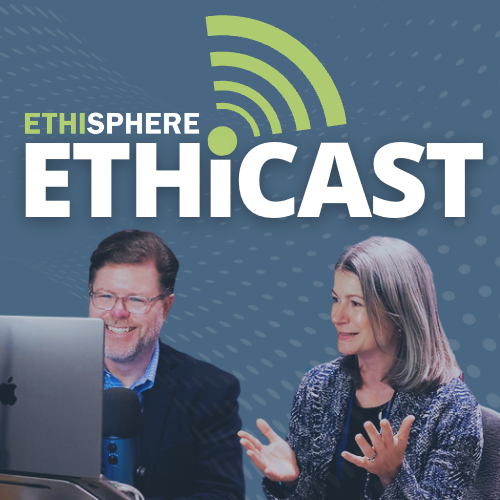[00:00:00] Speaker A: Hi everyone. Today we're going to talk about how you can strengthen your company's Speak up program through solid training and trust building. I'm your host, Bill Coffin, and this is the Ethicast.
Reporting misconduct at work is one of the existential struggles of the ethics and compliance field.
Most of us know that when we see something wrong, we're supposed to speak up. But that simple truth is made much more complicated when those moments occur thanks to concerns over retaliation, lack of confidence that anything will come of the reporting, pervasive cultures that reward silence, and more.
Ethisphere's own data shows that around 85% of people say they would report misconduct at work if they witnessed it. But then when the moment of truth arrives, less than half actually do so.
And in many ways, nobody feels this pain more acutely than ENC leaders themselves who would love for nothing more than to shrink that Speak up gap to nothing.
With us today is Gary Burke, partner, Global integrity and Compliance leader, Forensic and integrity services at EY.
Gary has over 20 years of experience providing investigative and forensic accounting services to clients involved in internal regulatory or dispute matters.
Gary is currently leading EY efforts to help governments, healthcare and public sector clients maximize funding opportunities and comply with regulatory compliance requirements. He is also the co office leader of the EY Dallas Forensics practice. Gary, welcome to the show.
[00:01:33] Speaker B: Thanks Bill. It's absolutely great to be with you today. Big fan of ethicast, big fan of yours and really appreciate the opportunity to talk about this very important topic.
[00:01:41] Speaker A: Ethisphere data shows obviously that when people choose not to speak up against misconduct, it's often because of a lack of trust in the system. So my question to you is, where do you see that trust and Speak up programs breaking down in most organizations?
[00:01:56] Speaker B: Yeah, thanks Bill. You know that data point you shared is certainly interesting and frankly a bit troubling. In today's fast moving environment where pressure on individuals is really constant, there certainly is no shortage of challenges to one's integrity when confronted with ethical dilemmas.
When I think about Speak up programs, I think about two primary components that will influence whether someone reports my conduct when they do observe it. The first is awareness of the program and the second is trust in the system.
In the most recent EY Global Integrity report, which is a survey of over 5,000 employees and board members, we saw a meaningful increase in the perception of program awareness. Speak up related questions are now commonly included in company surveys, culture assessments, which certainly is a positive sign.
Now turning to your question about trust, we did observe several reoccurring themes that highlight opportunities to strengthen employee confidence in programs.
These include the belief that nothing will happen if they make a report, fear of adverse consequences, again if they make a report, a low visibility of the outcomes and transparency in the process, and then finally, cultural barriers, which is when speaking up may be viewed as disloyal or confrontational.
I'll go a bit deeper into the first three themes.
Lack of accountability is the number one reason respondents gave for not reporting concerns. Many believe their reports would not be acted upon. There was also a perception that unethical behavior is tolerated when it involves senior leaderships or even high performers.
So in other words, if I make a report, nothing will happen.
The second theme is the fear of retaliation, and clearly that further erodes trust in the process.
A third of the respondents said they didn't speak up due to concerns about their career progression, whether that's promotion, job security, or even advancements within their current department.
Another third cited fears for personal safety. So Bill, you can see the lack of accountability plus the fear of retaliation can really have a depressing impact on one's desire to make a report.
The third theme that we identified was the lack of transparency.
Many employees felt that they didn't know what happened after they made a report.
That said, we've seen some promising advances in technology used to administer programs, things like greater anonymity when reports made, broader digital intake methods and even compliance AI chatbots.
Still, there's room to improve transparency with the reporters through periodic updates on the investigation status and certainly when appropriate, sharing the resolution of reporting complaints.
So Bill, with all that said, I think we're seeing some encouraging progress in terms of awareness around speak up programs, but certainly there's still opportunity to build trust within the organizations.
[00:04:56] Speaker A: What advice do you have for organizations that wish to extend their trust building efforts around SpeakUp to other parts of the enterprise such as HR audit, anti bribery, anti corruption, with the understanding, of course, that all these different constituencies require different approaches.
[00:05:11] Speaker B: You know, my initial reaction is that we shouldn't expect to make employee trust a compliance only issue. I think driving a culture of integrity is a responsibility of all the departments and functions within an organization, from the board to senior leaders through line employees.
Every function has a unique role to play in building trust.
So starting with hr, you know, a leading practice that we see is the the constant and consistent collaboration between HR and compliance, especially when it comes to gathering broad employee sentiment by including integrity or culture related questions in company wide surveys or even periodic culture assessments.
Where we're seeing that collaboration Deepening is when the survey results are enriched by using historical SpeakUp data to draw out correlations and comparisons. When this information is cut by department or geographic location, these comparisons often reveal thought provoking insights and areas for robust discussion.
A couple of the thoughts on hr. You know, HR has the ability to strengthen trust by ensuring consistent disciplinary action, objectivity in investigations and transparency in the Speak up process related to retaliation. You know, HR can create and execute processes to proactively detect signs of retaliation and promptly address any suspected or reported instances of that retaliation.
Switching gears to Internal audit. You know there certainly are best practices in collaborating with audit to leverage not only their reach within the organization, but their objectivity and their independence mandates.
First, compliance can work with internal audits to embed culture related or trust related content into audit scopes. You know, this can include hotline awareness, hotline usage, KPIs, retaliation policies, and even open ended culture questions in the interviews or process walkthrough discussions led by audit.
Another practice is linking allegations and reports that are made through the speaker program to specific internal controls.
When this is done, when these are linked, this often identifies perhaps weak controls based on how many times they're pinged by an allegation. And that information is extremely valuable for audit when they're planning their procedures for the year or even planning specific remediation efforts.
Finally, it's becoming common to subject the whistleblower hotline and program to periodic audit by the internal audit function. These audits not only identify targeted improvements, but can be summarized, published and shared within the organization to deepen trust in the program.
Turning to anti bribery into corruption I wanted to share another data point from the research which indicates 68% of of reported integrity incidents involve a third party.
Compliance in ethics and compliance routinely works with legal supply chain sales and internal audit. When it comes to managing third party risk, many organizations include integrity and speak of awareness in the third party management lifecycle. That's from onboarding to audits to offboarding third parties.
We are also seeing a leading practice to include integrating Speak up history into the onboarding activities and specifically data used in risk assessments and vendor due diligence.
For example, organizations can weight the corruption perception index utilizing their speaker history and this can really tailor the risks of the experiences for the organization.
So Bill, ultimately you know, trust is built through the collective actions of the entire organization.
All of an organization's functions has certainly a role to play in a Speak up culture, to act decisively when potential unethical behavior is identified and to protect whistleblowers when reports are made.
[00:09:10] Speaker A: So, Gary, what training would you recommend for organizations looking to improve their overall speak up efforts? Do most organizations need to train on awareness of their program, how to actually raise one's hand, socializing that the process will in fact work as it's supposed to?
All the above. What?
[00:09:26] Speaker B: Yeah, another. Another great question. So let me, let me first start off by offering a few data points from, from the EY Integrity survey. More than half of the employees who use the hotline said they felt pressured not to report.
Almost 4 in 10 so 40% doubted their report would ever lead to action.
And while a third of board members thought that whistleblower protections have improved, only 14% of employees agree. And that that 20% gap between what perception is and reality is, you know, that's exactly where trust has the opportunity and the vulnerability to break down.
I think training when deployed intentionally and certainly not as a check the box exercise, can help close that gap between perception and reality.
There are a few different types of trainings that we're seeing as a leading practice.
The first relates to training for senior leadership. As the data point highlighted, leaders often assume the system is stronger than it truly is and how it's really operating in practice.
Senior leaders would benefit from training that goes beyond the rules and focuses more on behavior or the hows, how to talk about integrity, how to show that reports are taken seriously, and how to demonstrate a zero tolerance for retaliation.
You know, Bill, I think it's been well documented that when leaders act with consistency, people notice.
The second type of training is manager skill training. For many employees that encounter a potential unethical experience, their manager is the first person they turn to to discuss the issue.
Some managers have never been trained on how to react when an employee comes forth with a potential allegation.
So these managers need practical skills, skills like how to listen without judgment, how to protect confidentiality, and how to escalate issues properly.
The third is for employees.
As I mentioned earlier, there's a perception of lack of transparency in the process. So employees need to know how the system works, what protections they have from retaliation, what can they expect after they speak up.
Training in this case should be really based on real world examples, sharing case studies and use and use cases and even role play to help employees see that the process isn't just theoretical, it actually works and it's designed to protect them.
Finally, you know, I think there's a great importance on the deployment of scenario based training. So going beyond policies, training on abstract compliance topics, you know, organizations can use realistic ethical dilemmas in that they've incurred. So sales practices, vendor relationships, workplace behavior. This will give folks real life examples of what they might occur in the field or in their office.
In advance of this approach, it allows employees to get practice in making decisions related to potential reporting in a safe space.
The concept is the more familiar they are with speaking up in training in a safe space, the more likely we'll do it when confronted with a true ethical dilemma in the field.
So in summary, you know, I think training should go, should be ongoing and should occur certainly more than once a year. Training should be role specific as leaders, managers and employees all need something different. And most importantly, it should be about building skills and confidence, not just checking the compliance box. You know Bill, I think this goes back to the old adage that policies don't create trust, people do.
[00:13:04] Speaker A: Well, Gary, we appreciate you coming on the program to share your insights with us on SpeakUp Culture. This is an area where a lot of organizations struggle, so your thoughts and especially those data points you shared are really, really valuable. So once again, thank you for coming on the program.
[00:13:18] Speaker B: You bet Bill. Thanks for having me. Appreciate the opportunity to discuss this topic.
[00:13:21] Speaker A: Be sure to join us on September 24th when Gary and his colleague Charles Kane, Managing Director, Forensic and Integrity Services at ey, will lead a free Ethisphere webinar, Building trust and taking SpeakUp seriously. In it, Gary and Charles will explore best practices around how organizations respond to employee reports of misconduct and the risks associated with failing to act when employees speak up. To register, visit ethisphere.comwebinars to appear as a guest on this program. To share a best practice or an ethics compliance success story, drop us a
[email protected] ethicast thanks so much for joining us. We hope you've enjoyed the show. For new episodes each week, be sure to subscribe on YouTube, Apple Podcasts, and Spotify. And if you don't mind, please share us with a colleague on LinkedIn as well. That really helps out too. That's all for now, but until next time, remember, strong ethics is good business.
[00:14:23] Speaker B: It.


